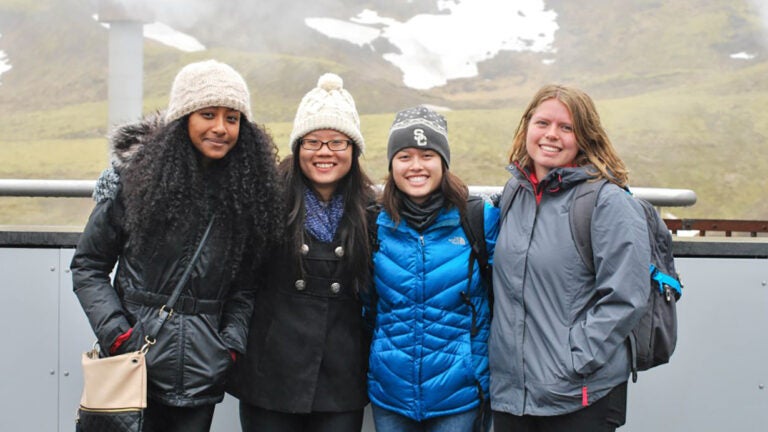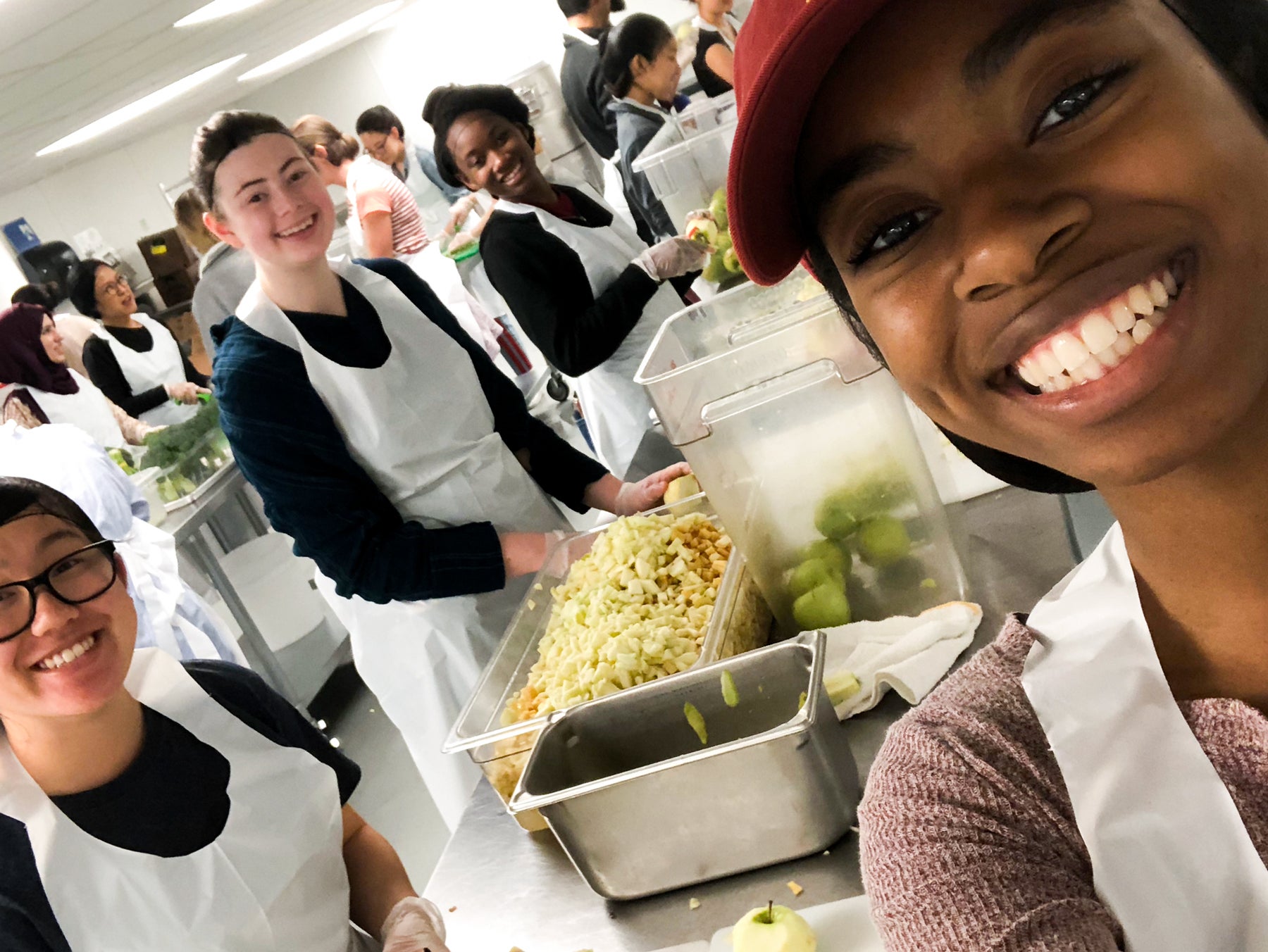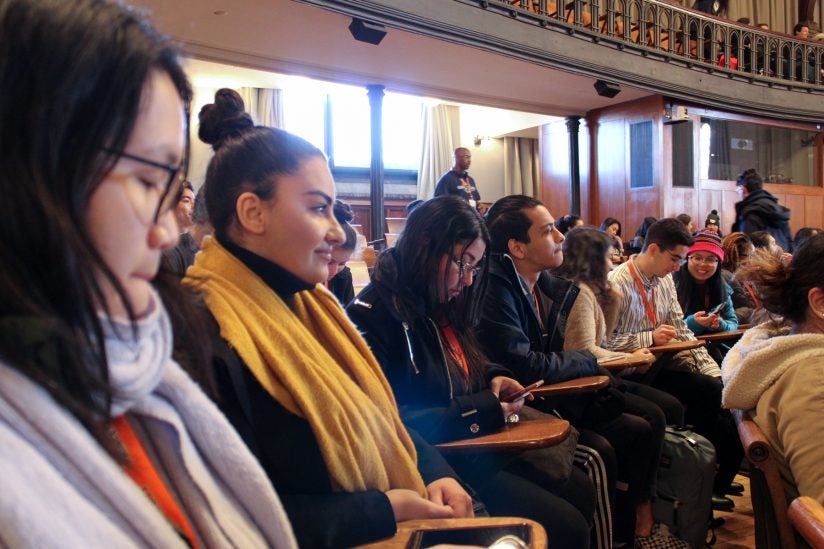
Fisher Fellows Fiza Khan, left, and Jennifer Han, second from left, used Fisher Fellowship funding to travel to Iceland with other USC students as part of a Problems Without Passports summer course. (Photo/Courtesy of Fiza Khan)
Students can afford to go abroad thanks to USC Dornsife fellowship
International travel, field research and community service projects are accessible to first-generation students at USC through the Fisher Fellowship program.
Some college students can afford to study abroad or go on community service trips over the summer. But students from low-income families often miss out on these life-changing experiences.
At USC, first-generation undergraduates with limited finances have an option that can help: the Fisher Fellowship.
The USC Dornsife College of Letters, Arts and Sciences program provides three years of funding for opportunities like the school’s popular Problems Without Passports and Maymester courses, which involve travel and typically require students to cover their expenses. Fellows can also use the funds to develop research projects with faculty members, attend academic conferences and pursue other enlightening experiences.
“It’s all about personal growth and finding out what they want to do in life,” said Amanda Bloom, who teaches writing at USC Dornsife and is the fellowship program’s faculty advisor.
“When they study abroad or do academic research alongside professionals in a foreign country, many of these students discover what they are good at, what their skill set is,” she said. “And it’s not always what they’ve been told.”
Fisher Fellowship helps first-gen USC students have full college experience

Becoming a Fisher Fellow felt like a blessing to Fiza Khan, a 2017 graduate who majored in international relations and Russian language and culture. Coming from a low-income background, she worried about missing out on important experiences at USC. Her classmates often talked about going abroad to study.
“Those programs can cost upwards of $7,000,” she said. “That was completely out of the question for me. Without the Fisher Fellowship, I would have never been able to participate in something like that.”
But as a member of the program’s first cohort, Khan received funding to join a 3-week Problems Without Passports course in Iceland, Norway and Finland. She studied how climate change is affecting indigenous populations throughout the Arctic region.
Beyond providing an invaluable research and travel opportunity, she said the summer class and a study-abroad program she completed in Russia are part of why she will be studying law this fall at Yale Law School.
“I believe those experiences were something that stood out to the admissions officers,” said Khan, who is interested in international law. “I don’t know if I’d be going to Yale right now if I wasn’t able to afford such programs.”
USC Dornsife alum created Fisher Fellowship to ensure students in need thrive
The Fisher Fellowship program launched in 2015 thanks to a donation from USC Dornsife alumnus Sam Fisher, who collaborated with USC Dornsife professor Steven Lamy to create the initiative. Fisher, an environmental studies major, had his own memorable experience studying in Belize. He wanted to ensure that other students at USC could also go abroad and potentially change their lives, even if they couldn’t afford to travel.
If they have expenses that are beyond reach, we try to help them so they can have transformational experiences.
Debbie Williams
Students with financial need, a declared major in USC Dornsife and whose parents didn’t earn a college degree are eligible for the program, which is administered through the school’s Office of Experiential and Applied Learning. Between six and 10 scholars are selected each year to receive support beginning as sophomores.
“We want to be a resource that they can depend on to help them move forward powerfully,” said Debbie Williams, the fellowship’s program and scholarship administrator. “If they have expenses that are beyond reach, we try to help them so they can have transformational experiences.”
In addition to providing access to valuable educational opportunities, the fellowship creates a community that ensures participating students feel welcome and supported at USC.
“It’s easy to feel left out as a first-generation or low-income student,” Khan said. “With the Fisher Fellowship, I had this built-in family of people who had similar backgrounds, and I knew I could always go to them if I was feeling down.”
For incoming first-gen students, program provides friendship and support
Montana Houston also appreciates the program’s sense of family. As a freshman spring admit from Seattle, she felt out of place and worried about being a semester behind her peers.
When she found the Fisher Fellowship, it helped her make new friends quickly.

“It’s been my gateway into the greater USC first-gen community,” she said. “Every time I see a Fisher Fellow, we’ll give each other hugs.”
Now a rising senior, Houston has a resume chockful of impressive accomplishments. She’s majoring in nongovernmental organizations and social change. She has a double minor in East Asian languages and cultures (with an emphasis in Japanese) and management consulting. In November, she traveled to Panama with a student group at the USC Marshall School of Business to provide advice and support to women running a small community bank.
“We helped them create ledgers to account for all the income they had,” she said. “I wouldn’t have been able to do that without Fisher Fellows.”
Giving back is key message in Fisher Fellowship program
Serving the community is a major component of the fellowship program, and fellows must lead at least one service project. Many choose to tackle homelessness.

Araksya Nordikyan volunteered as a Fisher Fellow with a nonprofit called School on Wheels, which provides tutoring support to homeless children in L.A. It was a fitting experience for the transfer student, who is pursuing a career in education policy.
“Education is considered the great equalizer,” she said. “Its importance cannot be denied.”
Nordikyan plans to finish her philosophy, politics and law degree and a progressive master’s in public administration next year. She has used her fellowship resources to increase her knowledge — by attending a human rights workshop in New York, a conference at USC on law and policy in higher education and a summit at Princeton University focused on first-generation college students.
“I would not have been able to afford those opportunities without Fisher Fellows,” she said.
Fisher Fellows share knowledge, resources with other USC students
Born in Armenia, Nordikyan immigrated with her parents at age 5 to Sherman Oaks. They supported her as she enrolled in community college, but couldn’t help her fill out her transfer application, apply for financial aid or polish her resume.
She learned about USC’s first-gen support programs, like the Fisher Fellowship, after receiving a scholarship from the Norman Topping Student Aid Fund. But she worries about other first-gen students struggling to find their way without that knowledge.
People come here and leave without knowing about these organizations, without knowing there are resources here to help them succeed.
Araksya Nordikyan
“USC isn’t scarce when it comes to resources, but you don’t know what you don’t know,” Nordikyan said. “People come here and leave without knowing about these organizations, without knowing there are resources here to help them succeed.”
In recent years, Fisher Fellows have become vocal advocates for more first-gen resources at USC. They participate in the annual first-gen summit and share tips with their first-gen peers. For example, Khan and another fellow, Jennifer Han, led a panel on getting involved in research with a faculty member.
“A lot of first-generation students can be timid,” Khan said. “They don’t necessarily know they can just go up to a professor and say, ‘Hey, I’m interested in the work you’re doing. I want to help.’”
Nordikyan said sharing those lessons with other students is becoming a bigger part of the Fisher Fellowship, and she sees it as a way to expand its reach.
“You learn so much from your peers and are able to apply everything you learn in the classroom through programs like this,” she said. “We walk in with our experiences, our own identity, and when we put that all on the table, that’s where the spark is created and we can get things done.”



